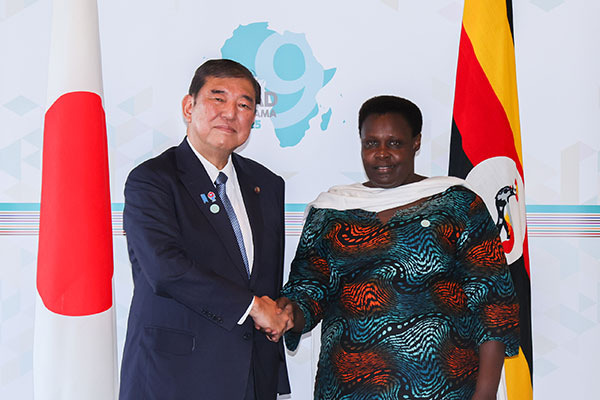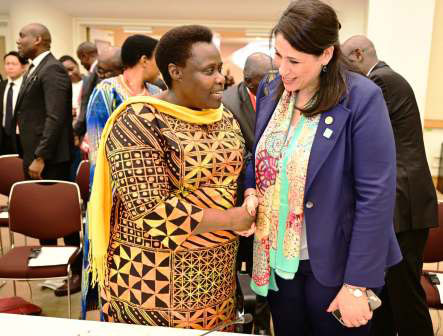
Vice President Alupo said Uganda was ready to deepen collaboration with Japan and other global partners
Tokyo, Japan | THE INDEPENDENT & AGENCIES | The 9th Tokyo International Conference on African Development (TICAD 9) concluded at the Pacifico Yokohama Convention Centre, Japan, on Aug. 22 with participating countries pledging to advance cooperation. The focus was on three key areas of the economy, society, and peace and stability.
Uganda’s Vice President, Maj (Rtd) Jessica Alupo, represented President Yoweri Kaguta Museveni at TICAD-9 held under the theme “Co-create Innovative Solutions with Africa.” At the conference, VP Alupo said the theme reflected Uganda’s priorities for technological advancement and innovation.
On Aug. 21 VP Alupo paid a courtesy call to Prime Minister Ishiba Shigeru, with who she agreed on further enhancement of bilateral cooperation and the role of the Non-Aligned Movement (NAM), of which Uganda holds the presidency.
PM Ishiba praised Uganda as Africa’s largest refugee-host country and stated that Japan would continue to support Uganda’s efforts as one of the co-hosts of Global Refugee Forum (GRF). He also spoke of Japan’s contribution to strengthening regional connectivity, the re-construction of the Karuma Bridge on the Northern Corridor and the Kampala Flyover in Kampala.tackling development challenges.
Vice President Alupo said Uganda was ready to deepen collaboration with Japan and other global partners to exploit available opportunities in technology transfer, industrialisation, infrastructure development, human capital development, and digital transformation in line with Uganda’s Vision 2040.
VP Alupo also held high-level bilateral engagements with Japanese companies, including members of the Japanese Business Federation, widely known as Keidanren and leaders of the Japan Foundation which is dedicated to spreading Japanese culture across the world.
VP Alupo’s delegation included officials from the Ministry of ICT and National Guidance, led by Aminah Zawedde, the Ministry’s Permanent Secretary, and representatives of business startups in the ICT sector under the UJ Connect Project in partnership with the Japan International Cooperation Agency (JICA).
Countering USA, China
This year’s summit comes as U.S. President Donald Trump’s tariff war and drastic cuts in foreign aid programs have negatively affected development projects in Africa.
Meanwhile, China has been expanding its foothold in the area since 2000 through infrastructure building and loan projects.
In his closing remarks, Prime Minister Ishiba Shigeru highlighted the achievements of the conference, TICAD 9, which was attended by representatives from 49 African countries, including Uganda.
“This (TICAD) has become a pivotal opportunity to define the partnership between Japan and Africa over the coming 30 years,” Ishiba said.
Ishiba proposed an economic zone connecting the Indian Ocean to Africa as the country seeks to play a greater role in the African continent while America’s presence there decreases and China’s influence rapidly grows.
“Japan believes in Africa’s future,” Ishiba said. “Japan backs the concept of African Continental Free Trade Area,” which aims to bolster the region’s competitiveness. Ishiba said Japan will extend loans of up to $5.5 billion in coordination with African Development Bank to promote Africa’s sustainable development to address their debt problems.

Greater role for Africa
Speaking at the event, the United Nation’s Secretary-General António Guterres, said “Africa must have a stronger voice in shaping the decisions that affect its future”.
He added that African nations are underrepresented in the international community and its decision-making process.
Guterres said the “unjust and unfair international financial architecture” must enhance African representation and endorse a strong African voice in the decision-making process, adding that building AI capacity in developing countries in Africa would help ease the digital divide in the region.
The Yokohama Declaration, adopted at the end of the three-day gathering, emphasised the need to address challenges, such as poverty across the African continent and the weakening of multilateralism.
In the economy section, the Yokohama Declaration reaffirmed the importance of the multilateral trading system.
At the conference, the Japanese government announced the formation of a committee composed of representatives of industry, government, and academia to support the African Continental Free Trade Area.
The declaration recognized the free trade zone’s role in promoting integration and connectivity in Africa by eliminating tariffs within the region.
It also underscored the significance of strengthening agricultural systems to combat food insecurity and of ensuring a stable supply of critical minerals.
In the society section, the Yokohama Declaration pledged to enhance cooperation between Japan and Africa in tackling infectious diseases and other health challenges.
The declaration noted a decline in the world’s official development assistance for Africa’s health care systems—an apparent reference to U.S. President Donald Trump’s administration plan to dismantle the United States Agency for International Development (USAID).
The declaration also called for encouraging youth exchanges between Japan and Africa and supporting startups led by young African entrepreneurs.
The Yokohama Declaration also stated that democracy and the rule of law serve as the foundation for Africa’s sustainable development, peace, and stability.
At the conference, Ishiba unveiled an initiative to create the Indian Ocean-Africa economic zone, which aims to help Japanese companies expand into Africa in collaboration with countries around the Indian Ocean.
“Under this initiative, we will further link Africa with the nations in the Indian Ocean region and support efforts in Africa for regional integration and industrial development so that further growth can be achieved,” Ishiba said.
Initiatives announced
Ishiba also announced several initiatives to encourage Japanese companies to move into the African market.
With an increase in Japanese companies exporting to Africa from manufacturing bases in India and the Middle East, the government also plans to utilise official development assistance to set up a distribution network linking African nations as well as the continent with countries outside the region.
The government also plans to establish an organ to match Japanese companies with those from other nations to allow for greater moves into the African market.
Under a broader plan to create a free and open Indo-Pacific (FOIP) region, the government is seeking to achieve an international order based on rules for the area from Asia to Africa. The initiative also seeks to strengthen ties with the Global South group of newly emerging and developing nations.
Another initiative announced by Ishiba was a proposal to use ODA to help cultivate the Nacala Corridor development project to link copper mining nations in the African interior with ports on the African east coast.
“This will not only promote African regional integration but also strengthen the links between Indian Ocean nations and Africa,” Ishiba said. One aim of the initiative is to also bolster Japan’s supply chain for important minerals.
Japanese companies and organisations were expected to sign about 300 memorandums of understanding regarding cooperative projects with Africa.
He also announced a program to train 30,000 African professionals in the field of artificial intelligence over the next three years. The next TICAD will be held in Africa in 2028.
 The Independent Uganda: You get the Truth we Pay the Price
The Independent Uganda: You get the Truth we Pay the Price



